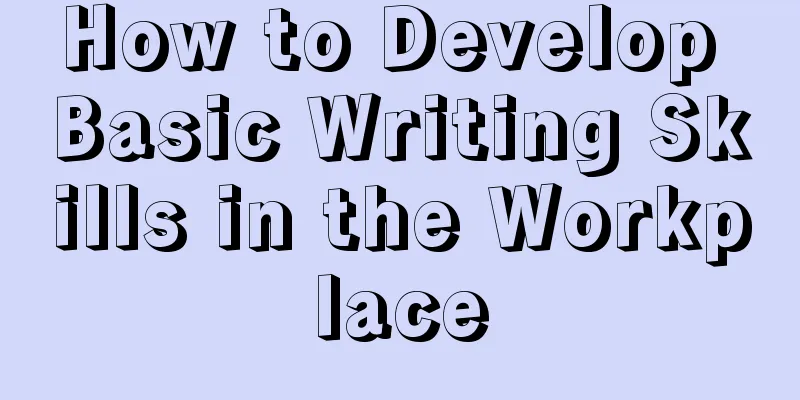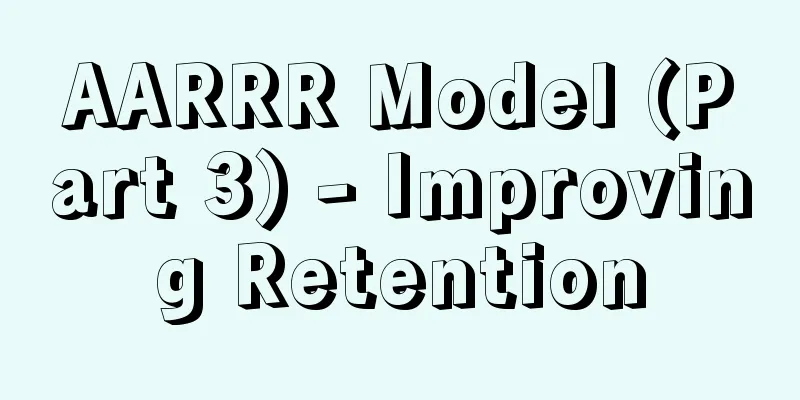How to Develop Basic Writing Skills in the Workplace

When we talk about the workplace, we can't avoid talking about communication and collaboration with others. Many people think that if a person is good at communication in the workplace, he must have good expression skills, good eloquence, good speaking skills, and can get things done. But I always think that communication, as a basic skill in the workplace, the core of it is to make others understand what you mean. To achieve this goal, being able to speak is one way, and being able to write is another way. For me, I prefer writing. Many things in the workplace do not require real-time communication. For example, if a project needs to be promoted or a plan needs to be clarified, many times these are the result of multiple communications. More importantly, there is no need to draw conclusions on the spot; what is needed is to think clearly. Expressing the ideas that have been "thought through" is the natural mission of writing. So in my opinion, writing skills must be a basic skill in the workplace. And the more you focus on doing the right thing and the more you value the quality of decision-making, the more important writing becomes. 01Why do most people in the workplace lack the ability to write? I believe that when we see others can write clear documents and use writing to improve team collaboration efficiency, we are envious. So in essence, I don’t think that people don’t value writing. What is the reason? Because writing requires our brain to produce high-quality continuous output. For example, when we make a PPT for a report, I actually use fragmented graphic and text information plus fragmented language information, and connect them into a complete output through your on-site expression. If you try, you will find that for the same report, it is much easier to make a PPT than to write a report document. We naturally focus on the key information in our minds. Just like when I plan today (it is Sunday when I write this article), I pay more attention to which coffee shop I will go to, what article I will write, and where I will have dinner. When I think about these, I am making a PPT in my mind. But in real life, you still have to deal with the long queues in the coffee shop, do you have any alternative plans? What if it rains, do you have any alternative plans? And so on. In real life, what you need to deal with is the arrangement of the transition paragraphs, and this is a requirement for writing ability. On the other hand, we rely too much on instant communication to solve problems. The advantage of instant communication is that it can solve problems quickly with less cost. For example, if something cannot be explained clearly by typing, it may be solved by just one or two sentences on the phone. However, many problems cannot be solved with just one or two sentences. They need to be discussed, discussed and collided constantly. At this time, the second product we fear appears: meetings. I have talked to many people who have held too many meetings. In fact, everyone is annoyed. It is not that they hate meetings themselves, but that they have held meetings but have not played a substantive role. Because they have not thought clearly, they only know that they want to discuss a problem, but they don’t know why they want to discuss it, what the background is, whether the relevant materials are sufficient, and whether everyone has their own opinions. Bringing a group of people together, solving the problem from scratch, and attempting to use instant communication to make a long-term decision requires very high abilities from the participants. Once this is not done, meetings become a burden. Therefore, writing itself is not easy, and we rely too much on instant communication to solve problems, which leads to many people not having the ability to write in the workplace. 02So what are the writing skills needed in the workplace? There are three key words in my standards: specific, focused, and sedimentable. The form doesn’t matter, it can be a paragraph or a document, but this ability must meet these three keywords. To be specific, it means that people can understand it. So whether the words are gorgeous, the language is lofty, and the intention is profound, these are not important. As a basic skill, the purpose of cultivating it is not to show off, but to improve our work efficiency. So unlike the college entrance examination essay, it does not need to have some literary color. Secondly, many people will ask, I see many people will write some work experience, some industry thinking, I don’t think so much, does it mean that I don’t have the ability to write for the workplace. Not necessarily. If these thoughts and reflections are written for yourself, then they are not workplace writing, but at most your own accumulation. But if your role is management, you need some "virtual" writing to clarify the strategy or explain your OKR, then these thoughts and reflections are essentially a tool for you to communicate. At this time, in my opinion, they are workplace writing. Focus means trying to talk about only one issue at a time. Workplace writing in different scenarios has different purposes. For example, the purpose of meeting minutes is to record the core information of the meeting and to consolidate the meeting. For example, the requirements document is used to express the requirements design plan in words so that people can understand it and it is logically rigorous. So if you write your meeting experience in the meeting minutes, and write the minutes of the requirements review in the requirements document, it will be weird. Each specific workplace writing scenario has its specific purpose, convention, and consensus. This is why Feishu provides a lot of templates when making documents. On the surface, it saves more time, but in essence it is more focused, and the template allows you to express a clear idea in a concentrated manner. The biggest advantage of writing is that it can be preserved. Before human information storage technology entered the information age, paper, as a carrier of information, had been used for thousands of years. When we want to know the minutes of the meeting held by Emperor Taizong of Tang Dynasty at the morning court more than 1,000 years ago, we can still find it by looking through historical materials. If it were not for writing, the many decisions made by Emperor Taizong of Tang Dynasty that morning could only be seen by those present at that time and space, but because of the precipitable writing, we can also see it more than 1,000 years later. Sedimentability is not essentially a writing ability, but an ability to organize information. You can write in many environments, but if you want to sediment it, the test is where to put it after writing and how to manage it. Someone asked, this seems to have nothing to do with writing. Yes, but it has a lot to do with the workplace. If the content you wrote is hard to find later, it means that it has not been preserved. To be more specific, do you often encounter disagreements between the two parties about a certain matter? One said that it was said in a certain way at the meeting, and the other said that it was said in another way. Then you go to confirm separately and find that no meeting minutes were taken at that time. Therefore, I believe that being specific, focused, and digestible are the standards of workplace writing ability. 03The last question may also be what you care about most: how to develop your writing ability in the workplace? First of all, I must say that I don’t think this is a skill that can be acquired quickly. It’s not like what many paid knowledge courses claim that you can acquire this skill by paying a certain amount of money. But there are some principles that can be abstracted. Based on these principles, you can practice them in your own working life and eventually develop writing skills that suit you. There are four principles in total. 1. Principle 1: Awareness FirstIn my opinion, this is the most important thing. You must realize that you often need to rely on writing to solve some problems. To be more specific, in some specific scenarios, writing is the most basic ability. Find the common features of these scenes, and when you encounter these scenes next time, you can think about whether you should use your writing skills. What are they? 1) Information needs to be broadcast For example, when an important function is launched, I need to let everyone know about it through an email to all employees; for example, after an important meeting, I need to use the meeting minutes to let the relevant people clarify the consensus reached in the meeting again. 2) Information needs to be structured For example, if a product needs to adjust its price, it may be something that can be agreed upon through verbal communication, but it must be supported by writing during the implementation process, because the relevant processes need to be structured. How to do the first step, how to do the second step, what needs to be done in each step of publicity, customer service, product, and technology, all of these rely on structured writing as a tool to promote this matter. Regarding structured writing, I will talk about it separately if I have the opportunity later. 3) Information needs to be processed asynchronously When different roles need to respond to the same information in different ways, writing is an essential tool. For example, when preparing materials for a meeting, the heads of different departments need to fill in relevant information. They are not required to write at the same time, but they must be there. Because writing is sedimentable, it can support asynchronous scenarios very well. 4) Information needs to be presented completely This is our most common scenario. The most intuitive advantage of writing compared to oral expression is its completeness. 2. Principle 2: Start SmallWhen many people hear about developing writing skills in the workplace, they want to write lots and lots of documents. It’s like doing fitness. If you want to lose weight, you start lifting heavy weights, but when you feel frustrated, you give up. In my opinion, workplace writing must start from a small point, so that it will be easier to develop a habit. Remember what I said before, the core of workplace writing ability is: specific, focused, and sedimentable. As long as it meets these three points, it doesn't matter whether it is a long document or not. Therefore, a speech in a work group, a meeting minutes, an email, a research report, can all be used as contact scenes for workplace writing, as long as the content you output is specific, focused, and sedimentable. 3. Principle 3: From others to yourselfIf we go back a little, we will find that the essential purpose of workplace writing is to communicate more efficiently. Therefore, organizing your writing content from the perspective of the other party is one of the most important ways of thinking in workplace writing. I call it: from others to yourself. Starting from the other party to your own content. In the same scenario, the writing target is different, and your content is also different. When writing for your boss, you often need to be more thorough on a single point, because your entire work is just one point for your boss; when writing for your subordinates, you often need to extend and inspire in a certain direction; when writing for a group of people, you often need to be more straightforward and simple, because everyone's knowledge reserves are different; when writing for business partners, you need to be more professional, because your professional ability is reflected between the lines. So, only by figuring out who is watching can I know how to organize the information I present. 4. Principle 4: Integrate to the EndThe last principle is to turn the above three points into a habit in your workplace. I have always believed that from an investment perspective, habit is one of the most cost-effective investment methods. If you develop a fitness habit when you are young, you may benefit from it until you are old; if you develop a writing habit in the workplace, you will benefit from it no matter what stage you are in or which company you go to. The integration mentioned here is not forced, but active. What is forced integration? It is involution. When you see others writing documents, you have to write them yourself. Not only do you have to write, but you also have to compete with the word count. So in the end, you have to write 5,000 words for a daily report. In my opinion, this does not promote the efficiency of communication, and may even produce a lot of useless content. To truly actively integrate, you need to think about a core question: Is it possible to improve the efficiency of a process through writing? For example, if a meeting is delayed because there are not enough people to attend, can this problem be solved through document comments? For example, if you did not think things through clearly before, which resulted in many things not being done correctly, then by putting the fragmented ideas into words first, and then shaping the ideas based on the words, you can form a valuable consensus and ultimately lead to an efficient discussion. These are all scenarios that can be thought about. Remember, the core of workplace writing is specificity, focus, and sedimentation. If these three keywords can solve current problems, then workplace writing may be a good solution. 04Finally, let me talk about why I write about topics related to basic skills. At the company's OKR review meeting at the end of August, the CEO shared with us his OKRs for September to November. There were only two items. One was related to Double 11, which was easy to understand because I work in a knowledge payment company and Double 11 must be our focus. The other one was "repairing the roof on a sunny day", which was very literary, but in my mind it was just three words: basic skills. On September 20, 2019, when Meituan went public, the splash screen copy for the company’s internal communication software was just five words: Practice basic skills hard. For me, basic skills have two values. On the one hand, it is my last psychological defense line when I encounter setbacks. In my opinion, any setbacks, blows, and failures, if they can help me cultivate basic skills, can be accepted, endured, and carried through. I may feel uncomfortable, but I will not collapse. On the other hand, basic skills are something I can take away. Being able to take them away means that confidence in the future can grow tenaciously in any soil . Author: Dalige, WeChat public account: Dalige |
>>: AI "invades" content platforms, are creators ecstatic?
Recommend
Why does Wish not place orders when the traffic is very high? How can I place orders quickly?
Traffic is very important for a store. If a store ...
Taiwan's top ten copywriting quotes, revealed~
This article selects the top ten copywriting phras...
ChatGPT + Xiaohongshu popular article, mass production of 100 notes in 1 day
How can we use ChatGPT for content marketing on a ...
Where can I find Amazon's off-site traffic? How can Amazon get more traffic?
Traffic is very important for stores. After all, s...
How to make consumers like your product as much as the founders?
What role does Xiaohongshu play in brand sales in ...
Video Account Redesign: What are Circles? How to Deal with the Redesign?
Yesterday, the video account had a major revision,...
How to unbind the credit card bound to Amazon? Is it safe to bind the credit card to Amazon?
In order to make shopping and payment more conveni...
Analyzing the five classic advertisements of the creative marketing giant "Mixue Ice City"
Mixue Ice City, a ready-made beverage company that...
Re-understanding the value of Weibo "field"
These days, Weibo's hot searches are playing o...
TikTok 2024, no good start
At the beginning of 2024, what is the development ...
Does Amazon Asia have a Korean site? How to manage it?
Nowadays, more and more people are trying to start...
With its assortment strategy, Luckin Coffee’s competitor is not just Starbucks
Luckin Coffee officially declared war on the tea m...
What are the requirements for Amazon video ads? How to upload them?
Now after opening a store on Amazon, everyone will...
How to set up exclusive discounts for Amazon members? What are the discount rules for Amazon Prime members?
Amazon Prime membership program is one of the impo...
What is the process for corporate foreign exchange settlement? What should be paid attention to when settling foreign exchange?
In the context of globalized economy, when enterpr...





![Xiaomi regains its position in the neighborhood, Ele.me is gaining ground everywhere, and BYD is heading global [Case Study]](/upload/images/67e6f68612b03.webp)



